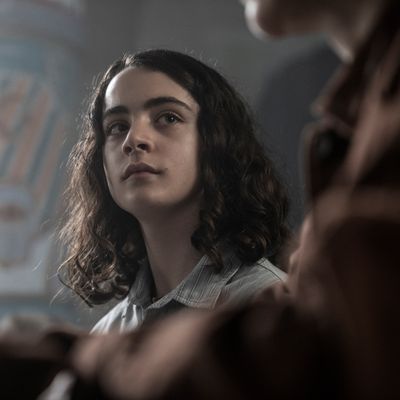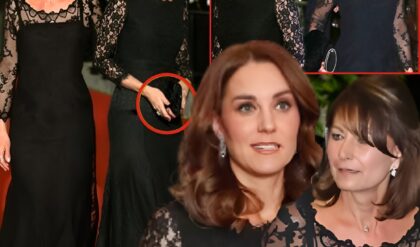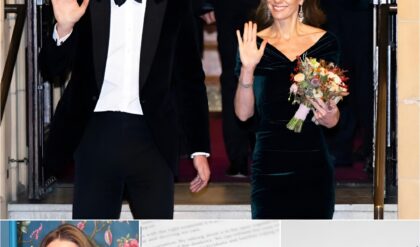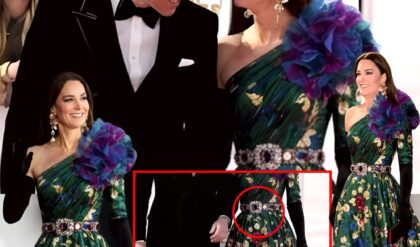
Photo: Emmanuel Guimier/AMC
For a time, it seemed possible that The Walking Dead: Daryl Dixon could be a sort of zombie-apocalypse travelogue, following our hero around Europe and learning about how different parts of the world have attempted to rebuild civilization since the outbreak. There’s a lot of potential to the idea; after 11 seasons of The Walking Dead and six spinoffs, changing things up is crucial, especially when it comes to the setting. How many different translations of zombie will we know by the end of this franchise?
But with the core trio of Daryl, Isabelle, and Laurent (plus Sylvie) settling down for a while at the Nest, Carol has become the season’s main traveler. “Moulin Rouge” does a decent job pushing the plot forward in Carol’s journey; she and Daryl haven’t reunited yet, but she’s in his orbit now, on her way to more direct involvement in the main story of the power struggle between the two major factions in France. The episode also manages to capitalize on the potential of seeing that journey play out, landing in Greenland for an intriguing side story that doesn’t overstay its welcome.
Ash needs some tools to fix the plane’s fuel leak, and after a brief run-in with some walkers hidden unsettlingly beneath the grass(nicknamed “tupilaq” after the flesh-eating beast from Inuit religion), the duo meets another pair who can help them out. At first, Eun and Hanna seem happy to offer them food, drink, and supplies, pleased to see other humans for the first time in years. Eun gives Ash a hug when she realizes he lost a child, a simple act of empathy that moves Ash. And Hanna explains that she and Eun originally came here for a climate-research project tracking glacier melt. She has a somewhat unconventional take on the virus: It’s Mother Nature’s way of healing the planet after humanity poisoned it. “Never screw with somebody’s mother,” Hanna says, speaking Carol’s language.
But it’s only a matter of time until these climate researchers show their true, creepy colors. Hanna toys with that crossbow long enough that it looks like a fake-out for a minute — a hint at something amiss that won’t be confirmed until later in the episode — but then she tells Carol she’s supposed to kill her, and we’re off to the races. It turns out Eun and Hanna’s plan essentially involves forcing Ash to procreate with both of them, “letting nature take its course” to begin to rebuild civilization. This plan, obviously, does not work; Carol barely even needs to manipulate Hanna at all before she turns on Eun and shoots her in the head, refusing to do her bidding any longer.
Carol also agrees to take Hanna with them, a promise destined to be broken. But when Ash fires a flare into the fog and kills Hanna — a pretty auspicious beginning for a man who somehow managed to get away with never killing another human until now — Melissa McBride plays the moment with a certain bittersweetness. There’s relief there, and gratitude, but for a second it felt possible Carol was sincere in her invitation. It probably never would’ve worked, but it’s nice to think it might have, isn’t it?
Or maybe Carol’s guilt is just getting the best of her. When she and Ash land in France a few scenes later, she convinces him to stay with the plane and prep for the getaway instead of accompanying her on the search for her “daughter.” Despite only knowing Ash for two episodes now, I’m already really dreading the inevitability of his discovering Carol’s lie, so it’s a relief to see him back down for the time being. Then again, delaying that confrontation to take care of some plot stuff means putting one of the season’s highest-stakes stories on pause.
I won’t be surprised if we don’t see Ash for a couple of episodes, and I have a feeling Carol won’t be back in the next two weeks as she promised. She follows a truck of Guerriers to a Pouvoir des Vivants outpost, where dozens of starving townspeople turn over their weapons and wait for food. Madame Genet isn’t there in person, but her second-in-command rounds up 19 “volunteers” who think they’re supporting Genet in exchange for a bed and some semblance of order and safety. Carol is forced into this group, which includes an English teacher named Rémy. He’s an interesting case study for an average French civilian susceptible to a rogue regime; his husband has lung issues that need medical attention, and the Maison Mère may be the only place he can get it. But it’s clear most or all of these people will likely become victims of the walker experiments at the Atelier.
Will Daryl need to save Carol from Genet’s clutches, or can Carol use her captivity to her advantage? (Maybe she’ll even form an unlikely kinship with Genet.) Ash may need to sub in because Daryl’s busy with his own drama. It takes a while for the conspiracy at the Nest to unfold, though. At the beginning of “Moulin Rouge,” things are looking ominously up, now that Genet’s hostages are safe. Everyone can relax for a moment: Sylvie cuts the hair of a traumatized but grateful Emile, and Daryl even teaches baseball to Laurent and Isabelle. The three of them feel more like a cute little family than ever, and it’s a nice change of pace to see Daryl in high spirits.
A lot of the episode hits on the themes of faith and doubt, an obvious through-line for this series. Isabelle is far from a perfect Christian, to say the least, but she has a strong belief in the value of, well, belief. Still, she’s conflicted about the idea of abandoning her home with Laurent to join Daryl overseas. Then again, to quote Laurent, “Home is wherever the people you love are.” After all, it’s all about the journey, not the destination; if things don’t work out at the Nest, at least that strenuous, emotionally taxing adventure gave them something to live for. It’s equivalent to Ash’s plane and Azlan’s pocket watch in that way.
But when Laurent disappears one morning, any hopes for the future become secondary. The episode retreads some ground here; we just saw Daryl leave the Nest and pull off a brutal rescue mission in the last episode, so it’s a bit of a chore to watch it play out again. Thankfully, though, not all is as it seems. If you have been waiting for sabotage ever since Losang and Jacinta’s second conversation about potentially moving up the ceremony, you won’t be surprised: Sylvie discovers Laurent locked away in a hidden room, isolated on the eve of his big day.
This discovery is smartly crosscut with Daryl’s mission, which quickly proves to be a false flag. The other men sent by Jacinta, including Emile, are actually there to distract and ultimately take out Daryl, Isabelle, and Fallou. But they’re no match for the trio, even with the benefit offoreknowledge. Emile explains his basic rationale for turning against his friends, though it’s pretty weak: After being forced to watch Pouvoir des Vivants torture and experiment on his allies, he needs to ensure the Union de l’Espoir succeeds at keeping Laurent around for the ceremony. This all must be worth it.
If faith represents salvation to characters like Isabelle, we see with Emile its corrosive effects — the way desperation can lead people to rely on a shared belief system even if that system is taken too far. With Jacinta, who insists it’s too late to let Losang’s prophecy not come true, we see that same twisted sunk-cost fallacy come into play. She stresses the congregation’s need for certainty, the opposite of doubt.
We hear the word doubt come up with Isabelle early in the episode, then Emile later, and finally with Losang, who quotes Descartes: “Doubt is the origin of wisdom.” It’s a point Izzy would agree on; doubt is part and parcel of faith, and to try to eliminate it altogether using physical proof misses the point. (This is, incidentally, my one issue with the final act of Elf, which involves someone reading Santa Claus’s real list on live TV to prove his existence.) Testing the prophecy by letting a walker bite Laurent is clearly a massively bad idea, but on a thematic level, it’s that pursuit of certainty that reads as the biggest red flag here. Losang knows church shouldn’t be about showing the congregation a photograph of God; it’s about helping people build an image in their own minds. Once he compromises that principle, there’s no going back.





